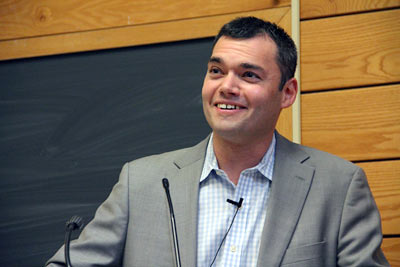Beinart: U.S. Jewish youth's disconnect from Israel is Zionist crisis
By Michelle Spektor

Many young American Jews are less likely than their parents to support and identify with Israel, said Peter Beinart, a senior fellow at the New America Foundation and senior political writer at the Daily Beast, in a lecture on campus May 1.
A major reason, he said, is because liberal ideals held by young American Jews conflict with the type of Zionist discourse advocated by major Jewish American organizations. This conflict is the subject of Beinart's latest book, "The Crisis of Zionism" (Times Books, 2012).
While 79 percent of American Orthodox Jewish youth feel connected to Israel, only 16 percent of their non-Orthodox Jewish peers do, he said, largely because of a failure of Jewish education in the United States.
"The American Jewish community is one of the wealthiest and one of the most religiously illiterate Jewish communities in the history of the world," he said. While Jewish education is a priority in orthodox Jewish communities, its lack of strength among non-Orthodox Jews results in a large young Jewish population that is disengaged with Judaism and/or alienated from Israel.
The non-Orthodox young Jews who are engaged with Judaism, according to Beinart, are liberal and feel at odds with certain Israeli political figures, policies and the harsh realities Palestinians face in the occupation of the West Bank.
"The American Jewish community has given the young American Jews no space in which to reconcile their liberal democratic values, their commitment to human rights, with the state of Israel," said Beinart. "Instead they're essentially asked to embrace a hear no evil, see no evil, speak no evil conception of the state of Israel."
The institutions that comprise the "American Jewish establishment," he said, are committed to fostering connections between Israel and Jewish youth but are hindered by generational divides.
Leaders of these organizations developed their connections with Israel between 1967 and 1982, he said, during which two wars threatened Israel's survival, and settler activism and political involvement of ultra-Orthodox Jews were fairly small and new. Israel was a more "innocent place" then, he said, and Jewish organizations are "mirroring" that perspective into a different present.
According to Beinart, Israel is a strong democracy, but its undemocratic governance in the West Bank threatens the peace process and the liberal democratic values upon which the country was founded. However, he noted that the Palestinian leadership's deference to "grotesque and unforgivable" acts of terrorism, denial of Jewish historical connections to the land and unwillingness to make concessions also destabilize the peace process.
"We have the obligation to face honestly the fact that there is a struggle in Israel today between people who believe that what makes the Jewish state precious is its liberal democratic character, and people who believe in a different vision of the kind of Jewish state they would like to see," said Beinart.
American Jewish organizations, whose members are usually politically liberal, tend to put these values aside when communicating the importance of Israel to the next generation of American Jewry. According to Beinart, this is why they are failing to instill Zionism in young Jews.
"We need to try to have with younger American Jews a different kind of conversation about Israel," said Beinart. "And it starts with no longer using Israeli democracy as an alibi, and instead using Israeli democracy as a rallying cry."
Beinart's lecture was part of the Foreign Policy Distinguished Speaker Series held by the Mario Einaudi Center for International Studies.
Michelle Spektor '12 is an intern for the Cornell Chronicle.
Media Contact
Get Cornell news delivered right to your inbox.
Subscribe